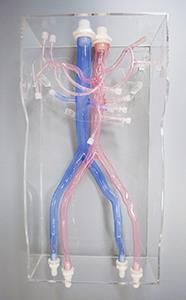
#Industry News
What is ECMO?
Extracorporeal membrane oxygenation
ECMO, short for extracorporeal membrane oxygenation, is a life support technique that can replace or support respiratory and/or cardiac functions in patients with severe respiratory or cardiac failure. As an advanced therapy, ECMO requires a sophisticated system that consists of several components, including a blood pump, a membrane oxygenator, a heat exchanger, a blood gas analyzer, and an anticoagulation system.
ECMO works by accessing the patient's bloodstream with large drainage and return cannulae, which are usually placed in the femoral or subclavian veins or arteries. The blood is then pumped out of the body, passed through an artificial lung (oxygenator), and then returned to the body. During this process, the oxygenator removes carbon dioxide and adds oxygen to the blood, providing the patient with vital gas exchange support. The ECMO circuit also has an anticoagulation system that prevents the formation of blood clots within the circuit.
ECMO systems vary depending on the specific application and the manufacturer, but the essential components include a blood pump, a membrane oxygenator, a heat exchanger, a blood gas analyzer, and an anticoagulation system. The blood pump circulates the patient's blood through the ECMO circuit, while the oxygenator supports gas exchange. The heat exchanger regulates the patient's body temperature, while the blood gas analyzer measures the blood's gas composition. The anticoagulation system prevents the formation of blood clots and maintains the durability of the ECMO circuit.
ECMO is mainly used as a therapy for acute respiratory distress syndrome (ARDS), different types of severe respiratory failure, and cardiac failure. The clinical application of extracorporeal support has grown rapidly in recent years, and ECMO can now be used at almost any age, from premature infants to elderly adults. ECMO can also support patients pre- and post-operatively during high-risk cardiac and thoracic surgeries. Moreover, ECMO has been used in combination with other advanced therapies, such as mechanical ventilation and continuous renal replacement therapy, to provide comprehensive life support.
In conclusion, ECMO is a complex and advanced life support technique that can provide vital assistance to patients with severe respiratory or cardiac failure. The basic principles and structures of ECMO involve accessing the bloodstream, pumping it out of the body, running it through an artificial lung, returning it to the body, and preventing the formation of blood clots. The clinical applications of ECMO continue to expand and include acute respiratory distress syndrome, severe respiratory failure, cardiac failure, high-risk surgeries, and other advanced therapies.





